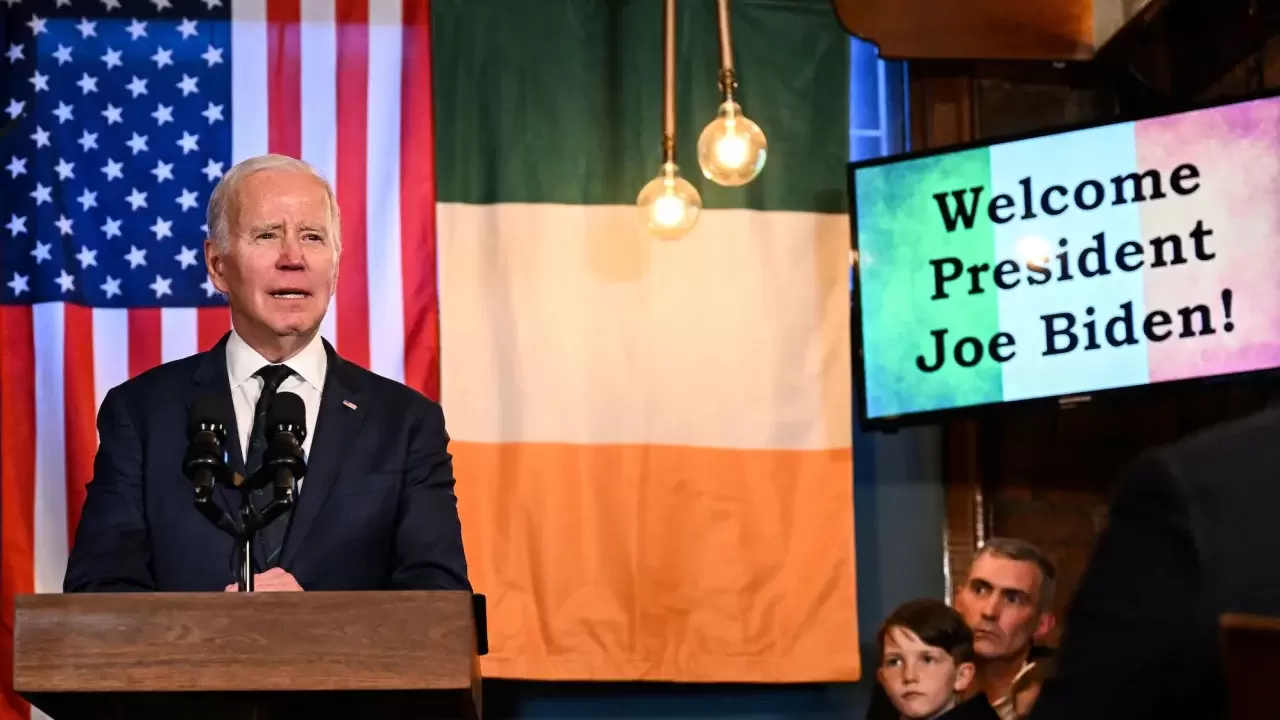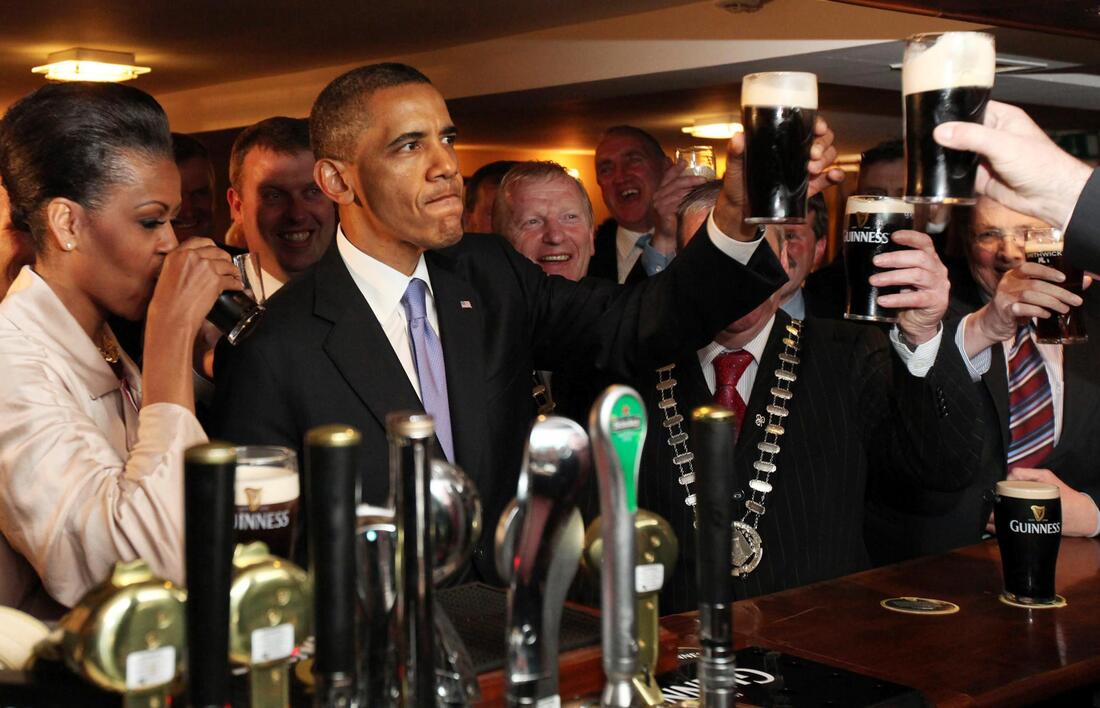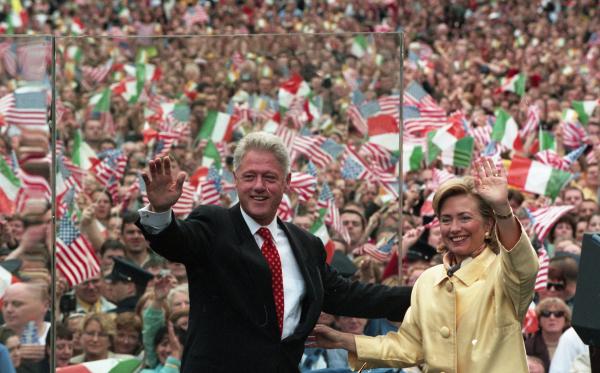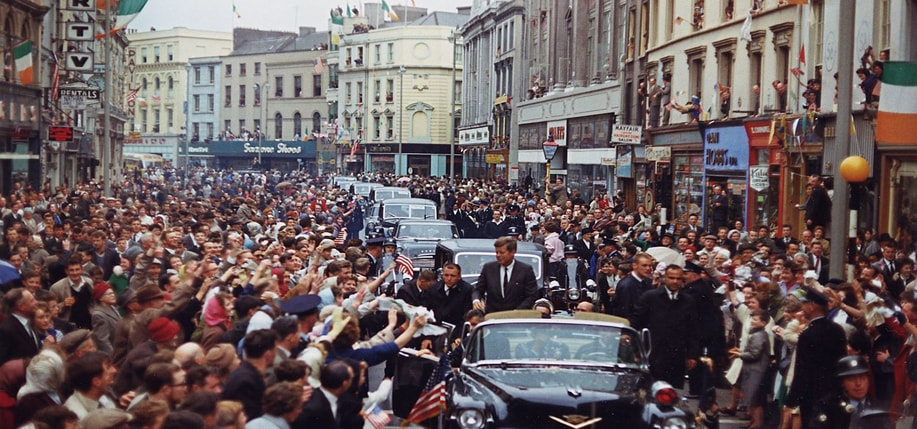|
Overview The United States has a rich history of presidents with diverse backgrounds. The first. George Washington, had strong links to England, with ancestors in the North-East and Oxfordshire. His ancestral home, Sulgrave Manor in Oxfordshire, is a living testament to his English connections. Fast forward to the twentieth and twenty-first centuries and at least four presidents have Irish connections, each with their own unique relationship to Ireland and the Irish-American community. In this article for Versus History, we will explore the Irish connections of Joe Biden, John F. Kennedy, Bill Clinton, Barack Obama, and Ronald Reagan, and how they used their Irish heritage to connect with their constituents, the Irish-American diaspora and the Irish themselves. Joe Biden Joe Biden, the 46th President of the United States, is the most recent to visit the island of Ireland in 2023. He is exceptionally proud of his Irish roots. When asked by the BBC for ‘a few words’, he jokingly retorted, ‘For the BBC? I’m Irish!’. Biden's great-great-grandfather, Edward Blewitt, emigrated from County Mayo, Ireland, to the United States in the mid-19th century. Blewitt settled in Scranton, Pennsylvania, where he worked as a laborer and raised his family. Biden has always been vocal about his Irish heritage, and he has visited Ireland several times throughout his career. During his tenure as Vice President, he made two trips to Ireland in 2011 and 2016, where he met with Irish leaders and reaffirmed the United States' commitment to the peace process in Northern Ireland. He repeated these sentiments in 2023. Biden's connections to Ireland have also influenced his political positions. He has been a strong supporter of the Good Friday Agreement, which was the cornerstone message of his 2023 visit, the landmark peace agreement that brought an end to sectarian violence in Northern Ireland. In his most recent visit, he was very keen to incentivise a return to Stormont by highlighting American economic willingness to invest in Northern Ireland, boosting investment from an already substantial $2 billion to $6 billion. He was also very keen to continue Bill Clinton’s approach of taking non-partisan approach to NI’s politics, positioning himself as an apolitical peacemaker. Barack Obama Barack Obama, the 44th President of the United States, has Irish ancestry on his mother's side. His great-great-great-grandfather, Falmouth Kearney, was born in County Offaly, Ireland, in 1830, and later emigrated to the United States. Obama visited Ireland in 2011, where he was greeted by large crowds of people. During this time, he visited a local public tavern associated with his ancestral roots. Obama's Irish connections were not as prominent in his political career as they were for some of the other presidents on this list. However, he did use his heritage to connect with the Irish-American community during his campaign for president in 2008. In a speech in Scranton, Pennsylvania, he spoke about his Irish roots and emphasized his connection to the working-class community. During his presidency, Obama continued to maintain strong ties with Ireland. He was a strong supporter of the Good Friday Agreement and visited Northern Ireland in 2013 to reaffirm the United States' commitment to the peace process. He also appointed an Irish-American, Dan Rooney, as the U.S. Ambassador to Ireland. Bill Clinton Bill Clinton, the 42nd President of the United States, had deep Irish connections that he used to strengthen his political career. Clinton's connection with Ireland began long before his presidency, and he continued to cultivate it throughout his two terms in office. Clinton's Irish heritage is a significant part of his personal story. His great-grandfather, Patrick Cassidy, immigrated to America from County Fermanagh in the mid-19th century. Clinton's mother, Virginia, had Irish roots as well. Clinton was always proud of his Irish heritage and often spoke about it publicly. Clinton visited Ireland several times during his presidency, including a trip in 1995, where he made a speech in front of a crowd of 120,000 people in Dublin's Phoenix Park. During his visit, he met with Irish politicians and visited his ancestral home in Enniskillen, County Fermanagh. Clinton's visit to Ireland was politically significant, as it helped to build a bridge between the United States and Ireland. He worked hard to support the Northern Ireland peace process, and his support was instrumental in bringing about the Good Friday Agreement of 1998. Clinton's Irish connections were also used to build support within the United States. He was able to mobilize the Irish-American community, which is a significant voting bloc in some states, to support his political agenda. Clinton's support for the peace process in Northern Ireland helped him win the support of Irish-American voters, who felt that he was working to help bring peace to their ancestral homeland. Clinton's Irish connections were also significant in the economic arena. During his presidency, he worked to strengthen economic ties between the United States and Ireland. He encouraged American businesses to invest in Ireland, which helped to create jobs and strengthen the Irish economy. His efforts were successful, as Ireland became a popular destination for American businesses seeking to expand their operations in Europe. Ronald Reagan Ronald Reagan, the 40th President of the United States, became more vocal about his Irish heritage as time went on. Reagan's father, Jack Reagan, was of Irish descent, and his mother, Nelle Wilson Reagan, had Irish and Scottish roots. Reagan often spoke about his Irish heritage, and even jokingly referred to himself as "the most Irish President since JFK." Reagan's Irish connections played a significant role in his political career. During his presidency, he worked to strengthen ties between the United States and Ireland. He helped to broker the Anglo-Irish Agreement in 1985, which laid the groundwork for the peace process in Northern Ireland. In addition, Reagan used his Irish heritage to connect with Irish-American voters. During his campaigns for president, he frequently spoke about his Irish roots and emphasized his support for the Irish-American community. Reagan's connections to Ireland were also reflected in his policies. He supported increased trade between the United States and Ireland and signed legislation that designated St. Patrick's Day as a national holiday in the United States. John F. Kennedy Perhaps the most famous Irish-American president, John F. Kennedy had deep roots in Ireland. His great-grandfather, Patrick Kennedy, emigrated from Dunganstown, County Wexford, in 1849. Kennedy was proud of his Irish heritage and often referenced it in his speeches. He even visited Ireland in 1963, where he received a warm welcome from the Irish people. Kennedy's Irish connections played a significant role in his political career. During his presidency, he was a strong supporter of the Irish-American community and worked to strengthen ties between the United States and Ireland. He appointed many Irish-Americans to high-ranking positions in his administration, including Secretary of State Dean Rusk and White House Chief of Staff Kenneth O'Donnell. Kennedy was also a vocal supporter of the civil rights movement in Northern Ireland. In 1963, he issued a statement calling for an end to discrimination against Catholics in Northern Ireland and urging the British government to work towards a peaceful resolution to the conflict. In closing ...
The Irish connections of American Presidents have played an important role in their political careers. Each of these presidents has used their Irish heritage to connect with Irish-American voters and to strengthen ties between the United States and Ireland. Given that some 30 million Americans claim Irish heritage (roughly one in ten Americans), this is unsurprising. Their connections to Ireland have also influenced political policies, to varying degrees. US Presidents have been strong supporters of the peace process in Northern Ireland and have worked to promote peace and reconciliation in the region. As the United States continues to grapple with issues of immigration and diversity, the Irish connections of these presidents serve as a reminder of the country's rich history of immigration, the important contributions of Irish-Americans to American society and the continued importance (albeit perhaps slowly declining) influence of the Irish-American lobby group in politics. Article written by Versus History Blogger Martha Fitzpatrick of the USA.
0 Comments
Leave a Reply. |
Categories
All
Archives
April 2024
|




 RSS Feed
RSS Feed